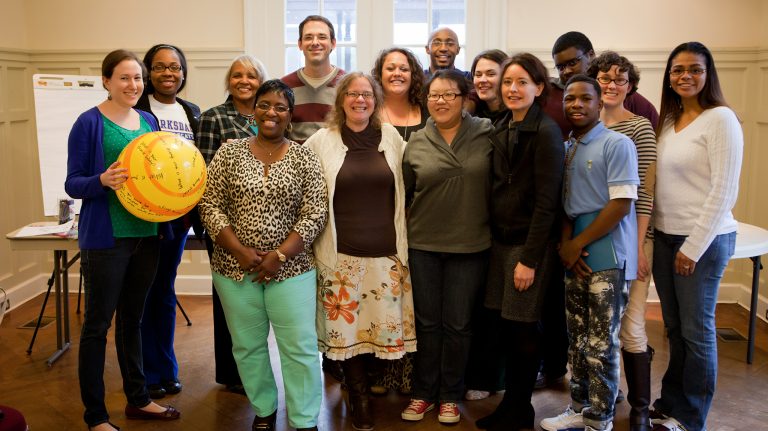December 15, 2017 By

John Green (back row, fourth from left) meets with community leaders in Clarksdale for the Problem Solving for Better Health project. Submitted photo by Emma Willoughby.
OXFORD, Miss. – The Center for Population Studies at the University of Mississippi is part of a collaborative partnership receiving W.K. Kellogg Foundation funds to help develop the health workforce in the Mississippi Delta.
Building on more than a decade of successful collaboration in the Delta region, the Rogosin Institute and its Dreyfus Health Foundation division have received a $1.8 million grant to fund the New Pathways to Health and Opportunity initiative over the next three years.
Core partners for the initiative include the Center for Population Studies, which will receive $340,450 of the total amount; the Aaron E. Henry Community Health Services Center Inc.; the Mississippi Hospital Association Foundation; and the Tri-County Workforce Alliance.
“Education and workforce development to address population health needs is critical, and we need to provide more opportunities for young adults from economically vulnerable areas to pursue professions in these fields,” said John Green, director of the Center for Population Studies, professor of sociology and director of the university’s society and health minor program.
“There are a range of health system career opportunities from frontline care to management and research that they can pursue to fill important gaps and achieve livable incomes and benefits, thereby further stimulating the economy. There is the potential for mutual benefit and the uplift of the Delta region, and our state more broadly.”
The New Pathways initiative works to improve health by increasing access to jobs and building a well-prepared health workforce in the Delta community. The program will provide educational opportunities for young adults and parents in Sunflower and neighboring counties, including job shadowing; health professions training for jobs such as certified nursing assistants, phlebotomists and community health workers; hands-on training and externships for nursing students; and leadership development workshops.
Officials for the other collaborating agencies concurred with Green.
“In Mississippi, recruiting and retaining quality health professionals, of any discipline, to a rural or remote community is challenging,” said Aurelia Jones Taylor, chief executive officer for the Aaron E. Henry Community Health Services Center. “The New Pathways program provides an innovative approach to introducing young adults to careers in the health care industry that develops workforce capacity for years to come.”
Barry H. Smith, president and CEO of Rogosin, said he is thrilled that the company is able to continue working with its partners in Mississippi to develop the health workforce, and is grateful to the Kellogg Foundation for this grant opportunity.
“Over the course of nearly 15 years of partnership, this collaborative network has truly turned into a community-based movement for better health and better lives,” Smith said. “We know that by building livelihood security, we are creating healthier communities and improving the quality of the lives of vulnerable children and families.”
The Center for Population Studies educates, conducts research and engages in public outreach concerning population issues. Working with the Department of Sociology and Anthropology and other partners within UM and beyond, it is the lead agency for the State Data Center for Mississippi, a joint program of the U.S. Census Bureau and the state. For more information, visit http://cps.olemiss.edu.
The Rogosin Institute is an independent not-for-profit treatment and research center focused on providing the best possible health care and quality of life for people with kidney disease, as well as those with diabetes, lipid and cardiovascular disorders, and cancer. For more information, visit http://www.rogosin.org.
Founded in 1930 as an independent, private foundation by breakfast cereal pioneer Will Keith Kellogg, the W.K. Kellogg Foundation is among the largest philanthropic foundations in the United States. Guided by the belief that children should have an equal opportunity to thrive, WKKF works with communities to create conditions for vulnerable children so they can realize their full potential in school, work and life. For more information, visit http://www.wkkf.org.
